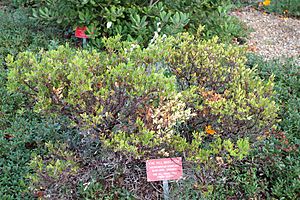Vine Hill manzanita facts for kids
Quick facts for kids Vine Hill manzanita |
|
|---|---|
 |
|
| Scientific classification | |
| Kingdom: | |
| (unranked): | |
| (unranked): | |
| (unranked): | |
| Order: | |
| Family: | |
| Genus: | |
| Species: |
A. densiflora
|
| Binomial name | |
| Arctostaphylos densiflora M.S.Baker
|
|
The Vine Hill manzanita (scientific name: Arctostaphylos densiflora) is a very rare type of manzanita plant. It grows only in Sonoma County, California, in the United States. This plant is so rare that only one group of 20 to 30 plants still exists in the wild.
These last wild plants are found on land near Sebastopol. This land is protected by the California Native Plant Society. A few more plants, about five to ten, grow on private land nearby. The area where these plants live is mostly chaparral, which is a type of shrubland, with sandy soil.
What Does the Vine Hill Manzanita Look Like?
The Vine Hill manzanita is a small shrub. It grows in low, spreading clumps, usually less than one meter (about 3 feet) tall.
Its leaves are shiny green and shaped like ovals or wide spearheads. They are quite small, less than three centimeters (about 1 inch) long.
When it blooms, the plant has clusters of flowers. These flowers are shaped like small urns and can be light to bright pink. After the flowers, it produces a fruit called a drupe. This fruit is about half a centimeter (0.2 inches) wide.
How Old Is This Plant?
The Vine Hill manzanita species, A. densiflora, likely first appeared about 1.5 million years ago. This might seem like a very long time! However, the larger group of plants it belongs to, the Arctostaphylos genus, is even older. That group first showed up during the Miocene era, which was millions of years before the Vine Hill manzanita.
See also
 In Spanish: Arctostaphylos densiflora para niños
In Spanish: Arctostaphylos densiflora para niños
 | Georgia Louise Harris Brown |
 | Julian Abele |
 | Norma Merrick Sklarek |
 | William Sidney Pittman |

